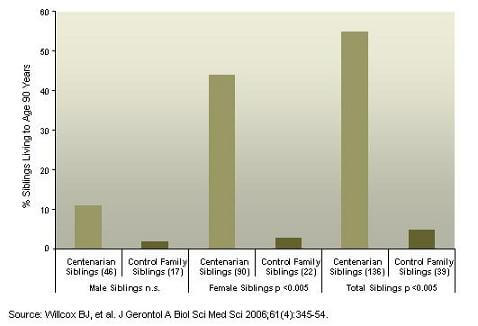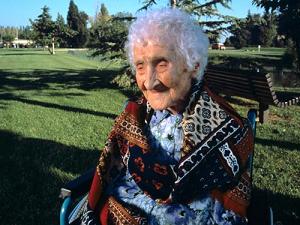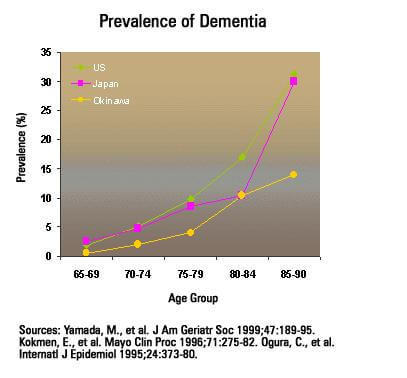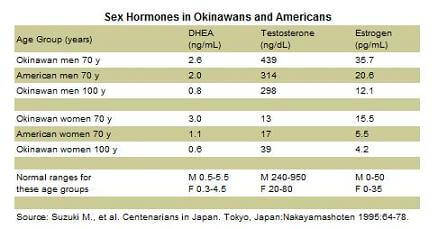
The fastest growing age group in the industrialized world is the centenarian club. Pushing past 100 used to be a rare feat, but most demographic studies agree that by 2030 there will be about a million of us enjoying the three digit lifestyle. Those studies don’t even count on the revolutionary longevity treatments we could develop in the next 20 years. We could hit that million mark much sooner, and we may start getting people past the 150 or even 200 mark. Either way, baby-boomers are going to become elder-boomers and before that happens we all need to take a crash course on what it means to live to be really really old. Turns out, it’s not that bad. Judging by the centenarians scientists have studied all over the world, living beyond 100 isn’t about slipping into decrepitude. A good portion of these elders live independent, happy lives without long suffering illnesses. How can you live past 100? Well, for now becoming a centenarian is a much about luck and love as it is about lifestyle. As technology advances, it could be about choice.
My Lucky Genes
It’s no surprise that genetics play an important role in helping you live into very old age. What is surprising is how little it matters up until then. Scientists in Scandinavia studied more than 20,000 twins, identical and fraternal, to understand how their genes were helping them get old. They found that when it comes to longevity, genetics really only becomes a dominant factor when you live past 60. If you make it into your 60s, there’s a good chance your twin will too, and there’s not much difference between fraternal and identical. But if you live into your 90s, an identical twin has a much better chance of keeping up with you than a fraternal twin. The work, published in Human Genetics in 2006, suggests that having the exact same genes as someone nearing centenarian status makes you almost three times more likely than a comparable sibling to get past 100 yourself.
Of course, even being a non-twin sibling of a centenarian is a pretty good indication that you’ll live a long healthy life. Studies of centenarians in Okinawa Japan have shown that longevity definitely runs in the family. In that community, having a sibling past the age of 90 gives you about a 50-50 chance of making past 90 yourself. Not bad odds at all. Okinawa has become well known for its aged population, with some of the highest rates of centenarians in the world: about 58 for every 100,000. That’s more than five times higher than in the US (~1 in 10,000). The sibling studies in Okinawa highlight how the island’s relatively insular community may have selected for some remarkably lucky genes.

What are the genes responsible for longevity? We’re not exactly sure yet. There are some likely culprits: the Apolipoprotein E gene (ApoE), the human leukocyte antigen genes (HLA), FOXO3A, the Sirtuin genes, and several others. Most have at least one major study associated with them, some have several. Determining the exact gene, genes, or combination of genes that lets you live longer and healthier is going to take some time. Luckily, centenarians can provide much insight into which segments of DNA are essential to longevity. Projects like the MPrize, which rewards scientists who are able to extend the lifespan of mice, will take the centenarian insights and hopefully translate them into medical gold.
The rapid progress of whole genome sequencing will one day allow each of us to understand which (if any) longevity genes we possess. From there, genetic therapies or protein manipulation could give us the benefits of those genes we don’t have. In short, while current centenarians are lucky to have the genes they have now, we could all enjoy the benefits of those genes in the future.
Why Would I Die? There’s So Much to Live For
One of the things most overlooked in the pursuit of longevity is the importance of love, social bonds, and purpose. Wherever you see clusters of people who live longer than the norm, you find communities in which family bonds, customs, and affection play a significant role. While individual results vary, most centenarians have spent most of their years with a stress-free outlook on life, and the strong support of their friends and family. Studies in Okinawa, Britain, and New England have all found this correlation between social bonds and longevity.
Why does community matter? I mean, is it really something as sappy as ‘love makes life worth living’? Well, maybe…it depends. Though the exact impact of social bonds on your body hasn’t been rigorously explored, stress has. Protracted mental tension is detrimental to brain function, your cardiovascular system, and your immune system. It could be that communities that help people cope well with stress, and eliminate it from their daily lives, are acting as buffers to protect the body from tension related damage. Or it could be that living is just easier when you enjoy it.
I’m not sure if companion bots and sex androids will fill this need for community, so we’re going to have to keep trying to form human-human bonds in the future. Of course, community is undergoing a major shift as more and more of us login online. There’s both opportunity and danger in that trend. Being able to find huge social networks of people with shared interest can help you form new and meaningful connections. There are millions who have found good friends and spouses on the internet. Still, tuning in to the web can also mean dropping out of socialized contact. That’s not good for your health. What’s the solution? Find ways for the net to augment your socialization, not replace it. Oh, and read Singularity Hub with a loved one.
Ok, But Would You Want To Live Without Cigarettes, Liquor, and Partying?
As much as genetics and community ties may help you live longer, there’s no doubt that lifestyle plays an important role as well. You can find plenty of anecdotes of centenarians who never dropped their bad health habits. Jeanne Louisa Calment, arguably the oldest woman who every lived at 122, was a smoker. On the whole, however, centenarians smoke less, drink less, eat better, and get more exercise than their shorter lived compatriots.

That explains, in part, the huge gap between the populations of men and women as they reach 100. Both the Okinawa Centenarian Study and the New England Centenarian Study show drastic disparity between the genders – roughly 85% of all people over the age of 100 were female. In general, men tend to partake in riskier behaviors more often than woman, including increased use of tobacco and alcohol. Yet there’s a flip side as well. Most men who make it past 100 are towards the healthier and happier end of the spectrum. That seems to be because the risky behavior has eliminated all but the most genetically gifted males.
So, should you give up the little vices in life just to live past 100? I mean, why die old and bored when you can die young and excited, right?
Well it’s a gamble. There are developing stem cell treatments which may one day replace your organs with new ones made with your own DNA. You could smoke your lungs out and just get a fresh one. Eventually, we could even have nanobots roaming your body, repairing the damage you cause it as it happens. Those technologies aren’t here yet, however, so you’re better off behaving yourself today to get a good chance and seeing tomorrow.
Besides, the golden years are actually much more enjoyable than many of us would imagine. You’re not going to spend all your time in a nursing home staring at the walls. A University of Cambridge study found that out of 958 (British) individuals over the age of 90, only about 25% were institutionalized. The rest were living independently or semi-independently. The same is true for the New England Centenarian Study, which found that 40% of its 700+ elders were living on their own.
Researchers in Denmark studied an entire regional population that was born in 1905 and still living by 1998, some 3600 people. As discussed in the paper in PNAS, the Danish team followed this cohort up through 2005 (so from 92 to 100 years old). Of the Danes who lived past 100, about 33% were living independently. Just as important, 70% of those centenarians had been independent when the study began. So, if you live into your 100s not only are your chances of being healthy pretty good, your chances of having been healthy in your 90s are excellent.
Of course, “healthy” for a centenarian means something a little different than for a 50 year old. Vision loss, hearing loss, and arthritis are so prevalent that most studies don’t discuss them. But centenarians do enjoy lives fairly free of other old age diseases. The NECS found that 43% of centenarians get age related illnesses prior to 80, 42% get an age related illness after 80, but 15% have no age related illnesses up to 100. Not bad.
And there are many technologies which may compensate for the basic infirmities of old age. Stem cell joint therapies are already old news for horses and dogs, they may help human arthritis sufferers in the future. Likewise, there are many technologies aimed at improving hearing and vision loss. If you do become bedridden, there are likely to be exoskeletons, or even robotic beds to help you stay mobile, get outside, and enjoy the world.
Ready to Join the Super Senior Crowd?
Let’s be honest, when you’re young and thinking about getting old you probably worry about two things: will I still be coherent, and can I still have sex? The answer is yes to both if you live in Okinawa. The Okinawa Centenarian Study showed that their elderly had lower cases of dementia and higher levels of sex hormones than populations in the rest of Japan or in the US. In fact, Okinawan centenarians simply had better cardiovascular health, lower cases of hormonally related cancers, better bone density, and less Alzheimer’s.


The answer probably lies in the longevity trifecta: genetics, community, and lifestyle. Okinawa is one of the Blue Zones, areas on the globe where these three factors come together and create a boom in the centenarian population. If you want to live longer, live like an Okinawan. First, build a strong community of friends and family and try to avoid needless protracted stress. Second, live healthy. Drink less, smoke less, eat better, and be active. Third, be born lucky so you have the best genetic advantages for long life. If that last one seems impossible, just remember the MPrize, genetic research, stem cell treatments, and countless other longevity studies going on out there. Scientists are working on ways to extend cell life dramatically and keep you living longer, but their research needs time to finish. If you want to make it to that point, or even to the Methuselarity, you can’t skip out on the first two steps. Hopefully, the lessons that centenarians can teach will allow all of us to live longer and healthier lives. I fully expect the human lifespan to keep increasing, maybe indefinitely. In a few years, I may be rewriting this article as “Get ready to live past 1000.” The longer you live, the more chance you have to access technologies to extend your life. It’s a good reason to take care of yourself. See you in the next century.
[image credits: Reuters, Okinawa Centenarian Study, Newspix /Rex Features, Sipa Press /Rex Features]
[sources: Okinawa Centenarian Study, Human Genetics, New England Centenarian Study, PNAS]


